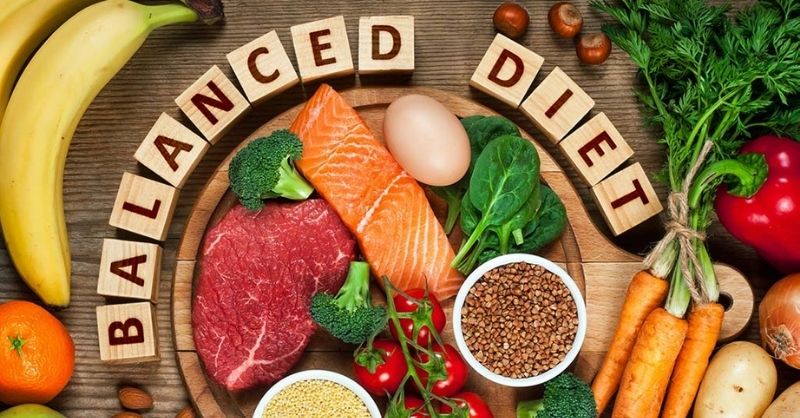Blog
Nutrition Expert in Bangalore – Balanced Diet – HealthyWE
 A Diet is all that we eat/take in a day. And a balanced diet is a diet that contain adequate amount of nutrients that we require in a day. A balanced diet includes six main nutrients such as proteins, energy, fats, minerals, Fibre, Carbohydrates, vitamins required for a child/human growth and for the proper maintenance of health is termed as a ‘balanced diet’.
A Diet is all that we eat/take in a day. And a balanced diet is a diet that contain adequate amount of nutrients that we require in a day. A balanced diet includes six main nutrients such as proteins, energy, fats, minerals, Fibre, Carbohydrates, vitamins required for a child/human growth and for the proper maintenance of health is termed as a ‘balanced diet’.
Importance of Balanced Diet:
- Balanced Diet leads to a good physical / mental health.
- Balanced Diet helps in proper growth of the body, and increases the energy / capacity to work
- Balanced Diet increases the ability to resist / fight diseases.
- Balanced Diet provides a better and happy lifestyle
Sometimes Supplements can be consumed if you cannot fulfill the necessary amount and or composition of balanced diet, or certain nutrition in higher amount than the average people, but one should also know that these supplements shall never substitute the necessary foods to our body.
Opinions / Specifications from experts make it easy to have a balanced diet and nutritious and healthy food.The various Food Varieties / Types we have are follows and all these have different types of important Nutrients. The quantity of food you need will definitely vary depending on various factors such as Age, Lifestyle habits, Health, Pregnant Women, breastfeeding and many more.
- Fruits
- Vegetables & Legumes / beans
- Grains & Cereals
- Meat & eggs, nuts, seeds
- Milk, cheese, yogurt or similar kind.
Fruits:
Fresh fruit within the 6 hours from a Tree is a very good source of vitamins and dietary fibre.
How much?
- 1 to 2year-olds, ½ piece a day, 2 to 3 year-olds, 1 piece a day
- 4 to 8 year-olds, 1½ pieces a day
- Above age 9 its better 2 pieces a day
Since, Fruit juices lack fibre occasionally a cup is enough. Their acidity can also damage tooth enamel. Dried Fruit and commercial fruit juices are often high in sugars, occasionally preferable.
Vegetables and legumes:
These food type have hundreds of natural nutrients such as Vitamins, Minerals & Dietary fibre. In order to get the most from this group:- Choose vegetables (capsicums, tomatoes, carrots, sweet potato, pumpkin, Beans, peas, broccoli, red cabbage, eggplant, cauliflower, mushrooms and potatoes) & legumes as per the season demands.
- <= 3year old – 2 to 3 serves a day & 4 to 8 year old – 4½ serves per day.
- Above 9 and adults can take 5-6 serves a day.
One serve is ½ cup cooked or 1 cup raw. Also, salads, raw vegies or soups at lunch & dinner.
Grains & cereal foods:
Grain foods are rolled oats, brown rice, wholemeal and wholegrain breads, cracked wheat, barley, buckwheat and breakfast cereals like muesli.Wholegrains consists protein, fibre, vitamins, dietary, minerals, whereas in processed grains, some of these nutrients are extinct.
How much?- <= 8year old – start with 4 serves/day
- 9 – 11 years of age – 4-5 serves a day & 14 – 18 year-old – 7 serves a day.
- Above teenage people, 3 to 6 serves a day depending on Age/Sex.
Meat, poultry, eggs, nuts, tofu & seeds:
Food items like Lean meat, poultry, fish, eggs, tofu, nuts and seeds provide protein, minerals and vitamins & dietary fibre. You can choose a variety of foods in this group.
How much?- <= 3 year – 1 serve/day
- Between 4 to 8 years of age – 1½ serves/day
- Between 9 to 18 years – 2½ serves/day
- In case of women – 2-2½ serves & men – 2½ to 3 serves/day
Milk, cheeses, yogurts:
Milk contain vitamins, protein & calcium. Added calcium with soy drinks can be used as a substitute for milk for children over age 1.Some nut / oat milks contain added calcium but they lack vitamin B12 and enough protein. Consult a doctor or qualified dietician regards to child’s total diet before using them.
Until aged 2, children should have full-cream milk. Reduced-fat varieties may be a choice after that. How much?- Age group 1 – 3 years: 1 to 1½ serves/day
- Age group 4 – 8 years: 1½ serves to 2 serves/day
- Age group 9 – 18 years: 2½ to 3½ serves/day
- In general, for men: 2½ to 3½ serves/day & women: 2½ to 4 serves/day.
Note: ‘serve’ is 1 cup of milk, or 200g yogurt, 2 slices of cheese.
Check atleast 100mg calcium per 100 ml is being present whenever you use plant based alternatives to milk such as soymilk.
Drinks:
For children, Milk is the first choice and water is the second choice.Discretionary choices:
Food that is not part of the above food groups are called Junk food / discretionary choices / extra food. Can also take unsaturated oils & spreads which are derived from olives, corn, sunflower, soybean, safflower, canola, sesame or grapeseed’s.
Junk foods may provide excess energy, fat, sugar & salt, which are often termed as “Rich in Energy but Poor in Nutrient”Biscuits, Ice-cream, Cakes, Hot chips, Burgers, Soft drinks, Cakes, Chocolates and lollypops, Fried food, Alcohol and etc.
[/vc_column_text][/vc_column][/vc_row]


